A Complete Guide to Baby Guinea Pig Care
Are you thinking of bringing a baby guinea pig into your life? In this video, I'll give you all the tips and tricks you need to become an expert guinea pig carer in no time!
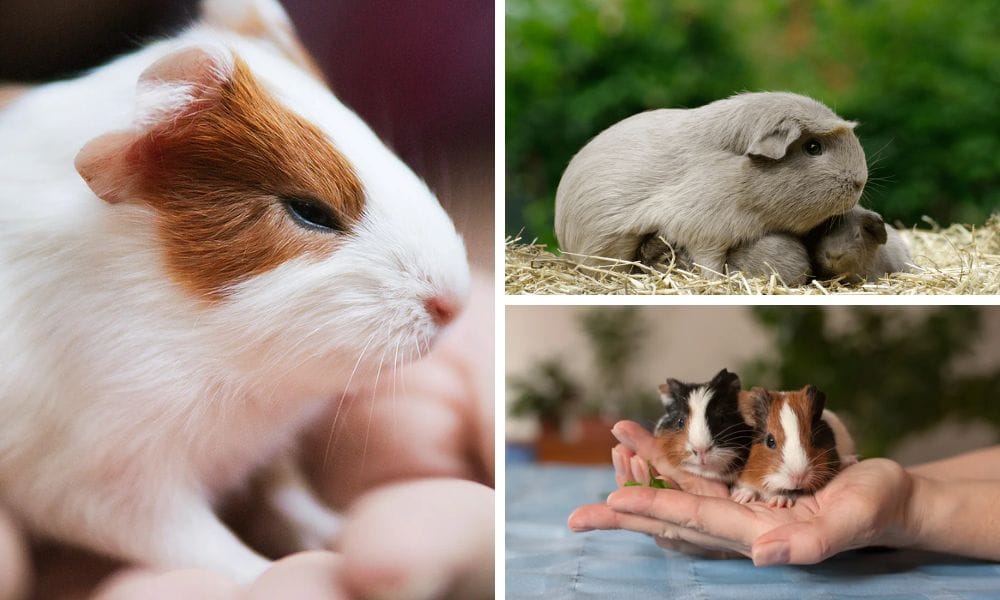
Introduction to Caring for Newborn Guinea Pigs
Caring for newborn guinea pigs is a rewarding experience that requires careful attention and dedication. From the moment they are born, baby guinea pigs—also known as newborn guinea pigs—depend on their mother for warmth, nourishment, and early socialization. These tiny guinea pig babies are surprisingly alert and active, but their delicate bodies need the right support to grow into healthy adults. It’s important to provide a safe, clean environment and to ensure they have constant access to fresh hay and water. As they develop, introducing solid foods and encouraging gentle interaction will help them thrive. With the right approach to caring for your newborn guinea pigs, you’ll set the foundation for a happy, healthy life as they grow and become cherished members of your family.
Choosing the Right Guinea Pig
When it comes to choosing a guinea pig, there are several important factors to consider to ensure a good match for your home and lifestyle. Baby guinea pigs can be especially endearing, but they do require more attention and gentle handling than adults. Take time to observe the guinea pig’s health and temperament—look for bright eyes, a healthy coat, and a calm demeanor. Many families find that females are a bit more social and nurturing, but males can also make wonderful companions with the right care. Early socialization is key, so choose a guinea pig that is comfortable being handled and shows curiosity about people. With patience and the right foods, such as alfalfa hay and vitamin-rich options, your new guinea pig will quickly learn to trust you and become a beloved part of your family.
Key Takeaways:
Understanding the needs of baby guinea pigs is crucial for their development and health. Proper diet, habitat, and socialization are key factors in raising healthy young guinea pigs. Knowing when and how to wean, handle, and care for baby guinea pigs can ensure they grow into happy, healthy adults.
Baby guinea pigs, or pups as they are affectionately known, are among the most endearing of baby animals. With their eyes wide open from birth, these little creatures are ready to explore the world. These tiny guinea pig babies are surprisingly alert and active, and their well-formed body at birth allows them to move around and grow rapidly, but they still need the right support to grow into healthy adults. Raising baby guinea pigs requires a lot of time, attention, and resources to ensure their wellbeing. If you’re considering adding a baby guinea pig to your family or have recently welcomed one, this comprehensive guide will provide you with all the information you need to care for your new pet.
The First Few Weeks of Life
The first few weeks are a critical period for newborn guinea pigs. During this time, they rely heavily on their mom for nutrition, warmth, and socialization, as she nurtures, grooms, and helps the babies bond and develop properly. A heat pack wrapped in a soft towel can provide additional warmth if needed, but be cautious not to overheat the little pigs. It’s also important to ensure that the mom is healthy and able to feed her pups adequately.
The first few days are especially important for monitoring the health and development of baby guinea pigs, as key milestones such as nursing and starting to eat solid foods often occur during this time.
Feeding Baby Guinea Pigs
Newborn guinea pigs can eat solid foods almost immediately after birth, but they also continue to nurse from their mother. During the first week, a mother guinea pig typically nurses her babies several times a day to ensure they receive enough nutrition. The mother’s grooming tongue not only cleans but also stimulates the pups’ digestive health. Fresh hay, particularly alfalfa hay, should be made available to them as it is rich in calcium, which is essential for their growing bodies.
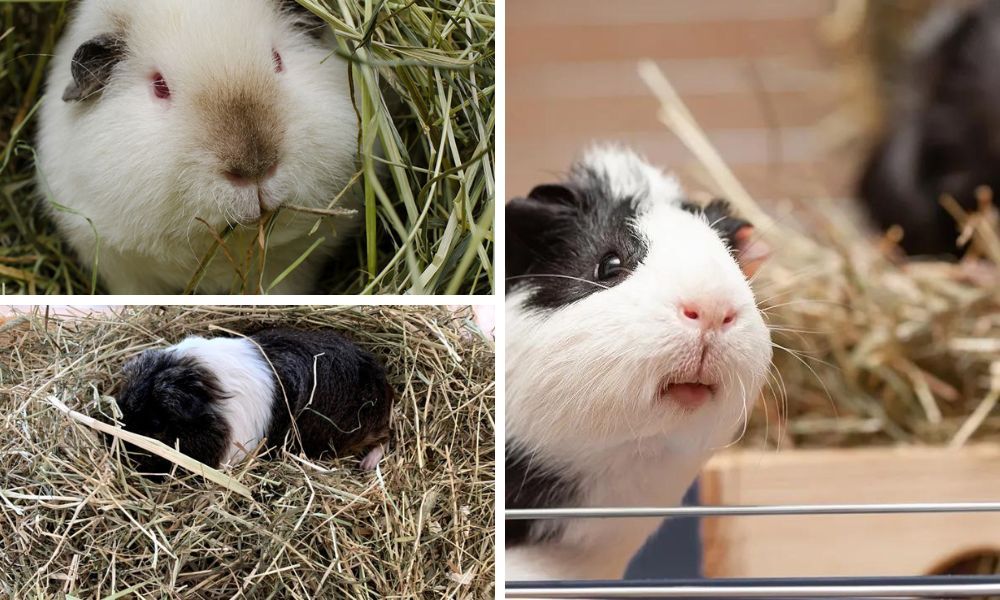
Weaning Young Piggies
Baby guinea pigs are usually weaned from their mother’s milk at around three to four weeks old. Over the next few months, baby guinea pigs will continue to develop and their dietary needs will change as they transition to adult foods. At this point, they should be eating a diet similar to that of an older guinea pig, which includes a variety of hay, fresh vegetables, and a small amount of pellets. Vitamin C is a vital part of a guinea pig’s diet, as they cannot produce it themselves, so ensure their diet is supplemented with vitamin C-rich foods.
Housing Your Baby Guinea Pig
A clean, spacious cage is essential for the health and well-being of baby guinea pigs. The cage should be lined with a soft bedding that is safe for them to chew on. Chew toys can also be provided to help with dental health. It's a great idea to keep baby guinea pigs in the same litter together, as guinea pigs are social creatures and thrive in the company of their siblings.
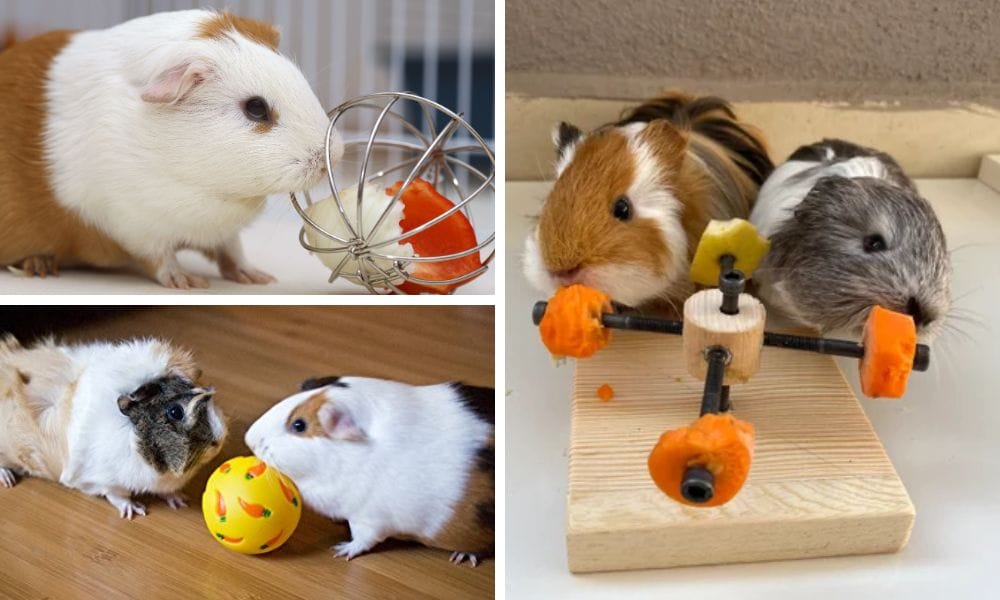
Creating a Safe Environment for Baby Guinea Pigs
A safe and comfortable environment is essential for the well-being of baby guinea pigs. Start by setting up a clean, spacious cage with plenty of ventilation to keep the air fresh. Make sure the cage is secure and escape-proof, as guinea pig babies are curious and can squeeze through surprisingly small spaces. Provide soft bedding, hiding spots, and a generous supply of fresh hay to encourage natural behaviors and keep them healthy. The environment should be calm and quiet, away from loud noises and sudden disturbances, to help your babies feel safe and relaxed. Regular handling and gentle socialization will help your guinea pig babies grow into confident, friendly adults. By ensuring their home is clean, secure, and enriched, you’ll help your guinea pigs thrive from their earliest days.
Grooming and Hygiene for Baby Guinea Pigs
When it comes to grooming, baby guinea pigs are quite low-maintenance, but there are still some key practices to ensure they stay clean and healthy. From the moment they're born, guinea pig babies benefit from their mother's grooming tongue, which helps keep their fur free of dirt and parasites. As they grow, they'll learn to groom themselves, but as a pet owner, you'll need to lend a hand. Regularly check their coat for any signs of matting or dirt, and gently brush them to keep their fur smooth. This not only keeps them clean but also provides a bonding experience for you and your baby piggy.
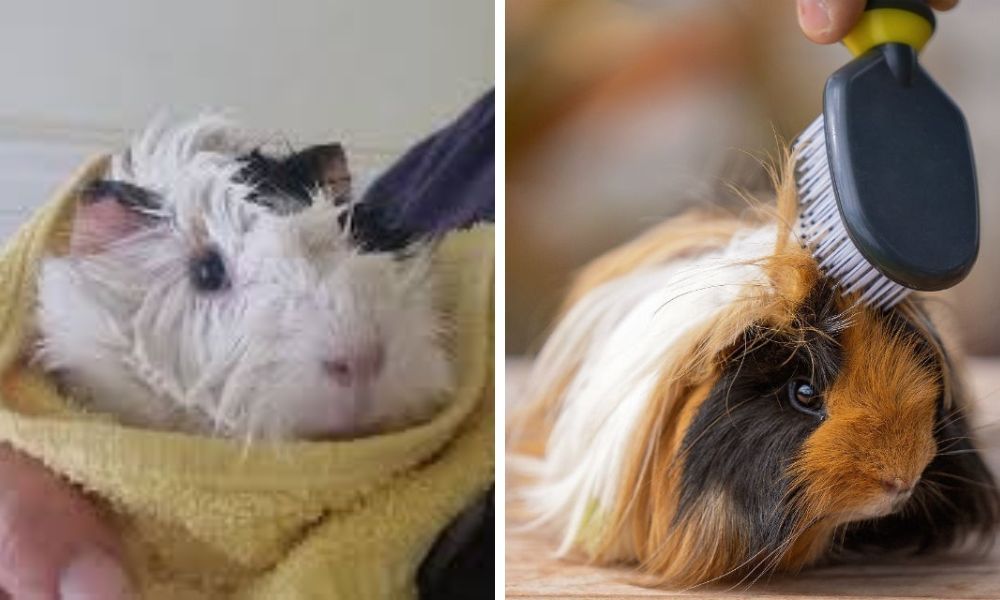
For those baby piggies who haven't yet been fully weaned, it's important to maintain a clean living environment to complement their mother's grooming efforts. Ensure their bedding is changed frequently to prevent the build-up of waste, which can lead to health issues. A clean habitat is crucial for the development of newly born guinea pigs, as it reduces the risk of infections and promotes overall well-being. Additionally, always provide a water bottle with clean drinking water, as hydration plays a vital role in maintaining a healthy coat and skin. Remember, a clean guinea pig is a happy and healthy guinea pig!
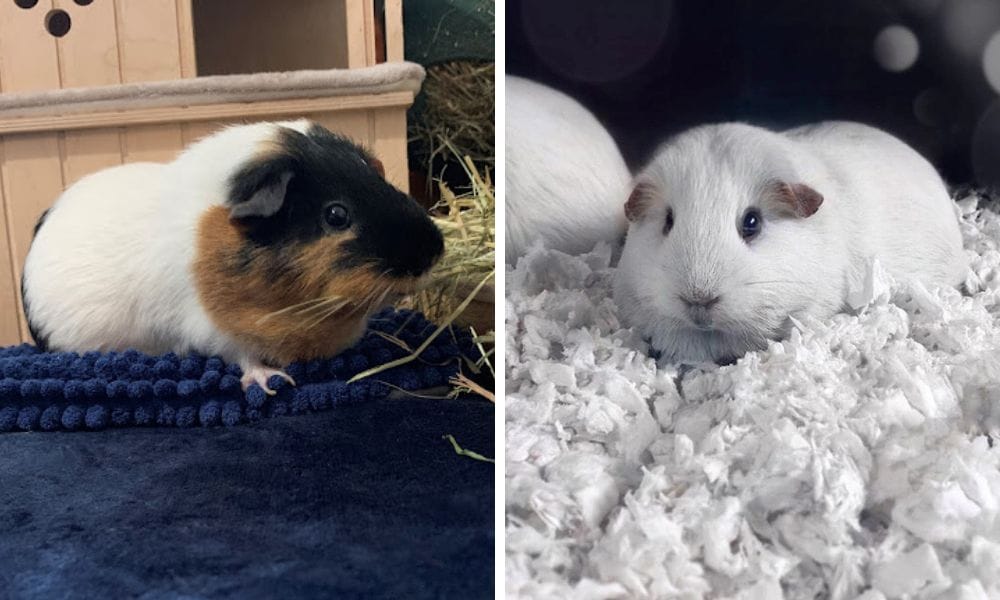
Understanding Baby Guinea Pig Development Stages
When you first welcome a baby guinea pig, or “pup,” into your home, it’s essential to understand their development stages. In the initial weeks, these little creatures are entirely dependent on their mother guinea pigs for nourishment and warmth. They are born with fur and open eyes, which means they’re somewhat precocious, but they still need the care and comfort of their mother’s grooming tongue to help them adjust to their new environment. Observing these interactions can be fascinating and provides insight into the natural behaviors of these adorable animals.
There are several important things to observe during the early development of baby guinea pigs, such as their weight gain and activity levels.
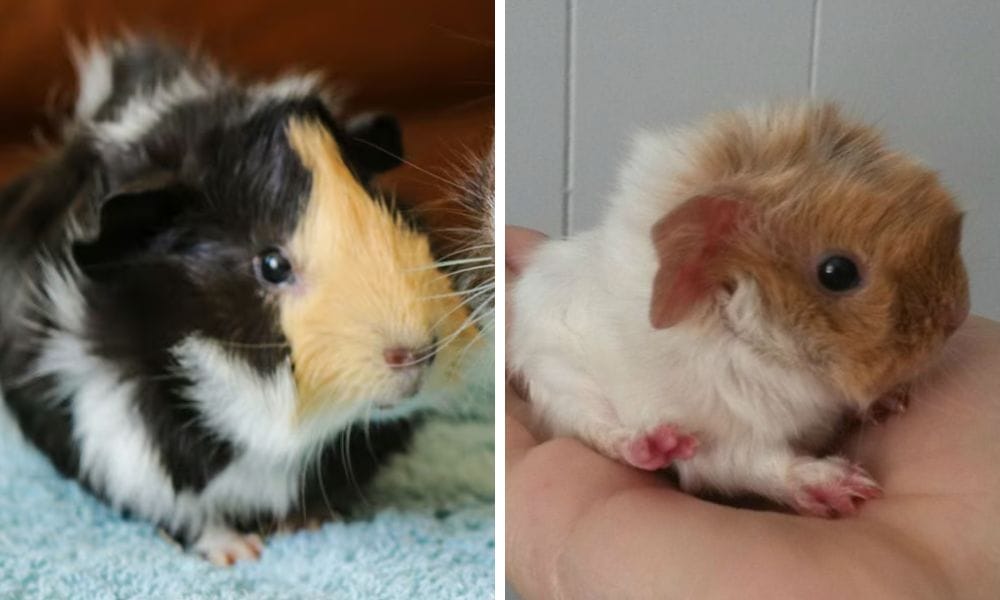
As the pups grow, you’ll notice changes in their behavior and dietary needs. Typically, baby guinea pigs weaned from their mother’s milk will gradually transition to solid food. This transition is a critical period in their development, as it sets the foundation for their future health. It’s important to monitor their growth and ensure they’re receiving the right nutrients. A guinea pig’s diet at this stage should include high-quality hay, fresh vegetables, and a small amount of pellets to provide the necessary vitamins and minerals for robust growth.
Exercise and Playtime for Baby Guinea Pigs
When it comes to keeping your baby guinea pigs happy and healthy, incorporating exercise and playtime into their daily routine is essential. Just like humans, these little creatures need physical activity to maintain their well-being. A spacious cage with room to roam is a good start, but providing a safe, enclosed area outside of their home where they can explore and play is even better. Use this time to introduce various toys and obstacles that encourage movement and mental stimulation. Remember, a tired guinea pig is a happy guinea pig!
However, it's not just about physical health; playtime is also crucial for the emotional development of your baby guinea pigs. During these sessions, they learn to socialize with their human handlers and fellow guinea pigs, which is vital for their overall temperament and happiness. Engaging with your pets through gentle handling and allowing them to interact with each other helps to mimic the social dynamics they would experience in the wild. This can be especially beneficial for a female guinea pig, as they are known to be quite social and can become lonely without proper interaction.
The Role of Genetics in Baby Guinea Pig Health
Understanding the genetics of your baby guinea pigs can provide valuable insights into their future health and well-being. Certain breeds may be predisposed to specific conditions, so it's important to be aware of these risks to monitor and manage them effectively. For instance, some guinea pig breeds might have a higher likelihood of developing dental issues, which can affect how you feed baby guinea pigs, as their diet may need to be adjusted to prevent or alleviate these problems.
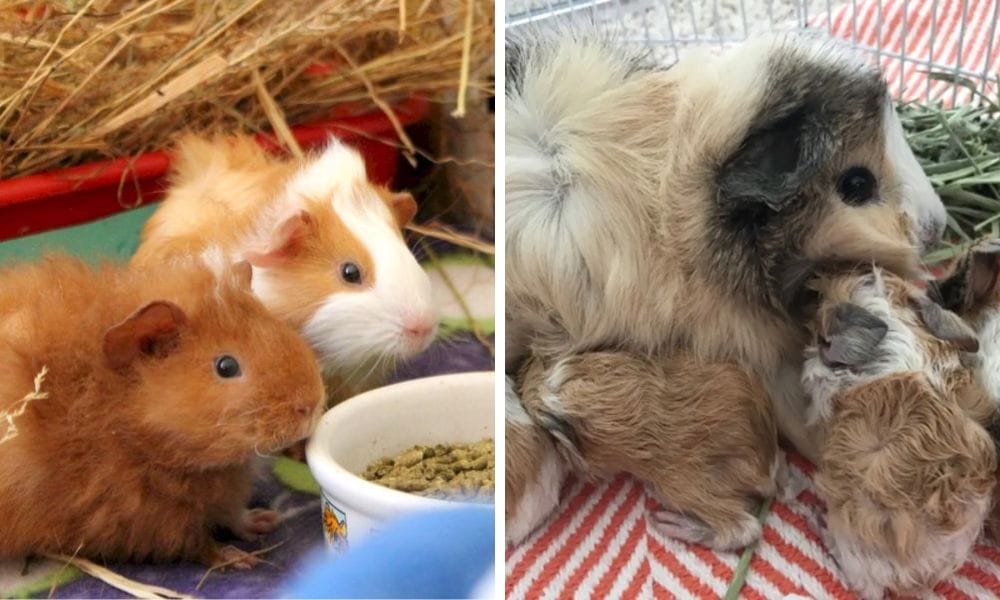
Moreover, genetics can play a role in the behavior and temperament of your baby guinea pigs. Just as a mother's grooming tongue is an inherited trait that promotes cleanliness and bonding, other inherited traits can influence how easily your guinea pigs can be re-homed or how well they socialize with others. By understanding these genetic factors, you can tailor your care and socialization efforts to meet the needs of each individual guinea pig, ensuring they grow up to be well-adjusted and healthy adults.
Bonding with Your Baby Guinea Pig
Bonding with your baby guinea pig is a rewarding experience that can also be beneficial for their social development. Female guinea pigs, in particular, are known for their nurturing instincts, often seen cuddling and communicating with their pups. As a pet owner, you can mimic these behaviors by gently handling your baby guinea pigs, speaking to them in a soft voice, and offering them treats. This helps establish trust and a strong bond between you and your new furry friend.
However, it's important to approach bonding with patience and to understand that each guinea pig has its own personality. Some may be more receptive to human interaction, while others may take longer to warm up. Always respect their space and comfort levels. Regular, gentle interactions can encourage your guinea pig to be more sociable and interactive, making them a delightful companion for years to come. Remember, the bond you form now with your pup will lay the groundwork for a trusting and affectionate relationship.
The Right Time to Re-home Baby Guinea Pigs
Deciding when to re-home baby guinea pigs is a significant step that requires careful consideration. As a general rule, baby guinea pigs should be allowed to stay with their mother until they are fully weaned, which typically occurs around three to four weeks of age. During this period, they learn essential social skills and are fed a diet that supports their rapid growth. It’s crucial to ensure that the pups are eating solid food confidently and have established a stable guinea pig diet before considering re-homing them. This transition from mother’s milk to solid food is a delicate process, and rushing it can lead to health complications.
If it becomes clear that the mother is neglecting her babies or the pups are not thriving, intervention may be necessary before the usual re-homing age.
Once the baby guinea pigs are weaned and have adapted to their new diet, it’s time to think about finding them a new home. It’s best to wait until they are at least six weeks old before they are re-homed, as this gives them enough time to develop a strong immune system and become more independent. When looking for a new home for your baby piggies, make sure it’s a safe and loving environment. A valid domain for a guinea pig includes ample space to explore, a companion for social interaction, and an owner who understands the commitment of caring for these adorable creatures. By ensuring these conditions are met, you’ll give your baby guinea pigs the best start in their new lives.
The Importance of Socialization
Handling baby guinea pigs gently and frequently is important for their socialization. Speak to them in a gentle voice and gently tap the cage before opening it to let them know you're there. This helps them get used to human interaction and can make them less bit nervous around people.
Identifying the Sex of Your Baby Guinea Pig
Determining whether you have male guinea pigs or female baby guinea pigs is important, especially if you are keeping them together. Sexing baby guinea pigs can be difficult, particularly for inexperienced owners, as the differences between males and females are subtle at a young age. By around three weeks old, they can become sexually active, so it’s important to separate males from females if you do not intend to breed them. The genital region of each sex has distinct differences that can be gently examined to determine their sex.
Health and Medical Care
Regular check-ups with a vet experienced in treating guinea pigs are important to ensure your baby guinea pig is healthy. Keep an eye out for signs of illness, such as shrunken bellies or changes in eating habits, and seek medical care if you notice anything concerning. Please pay attention to their teeth as well. Our guide below will help you with understanding Guinea Pig Teeth.
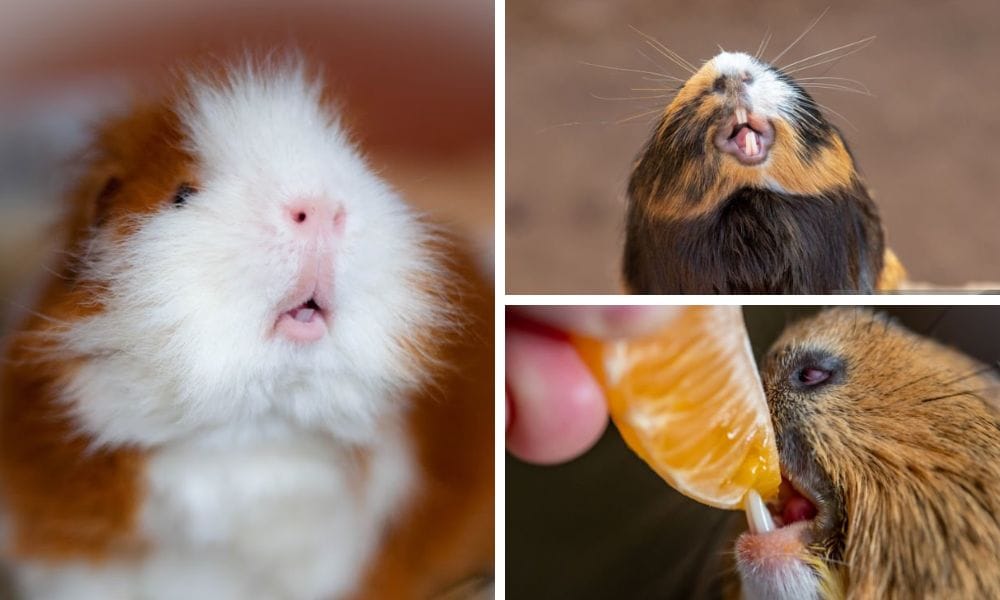
Care and Management
Proper care and management are the cornerstones of raising happy, healthy baby guinea pigs. In the early days, the mother guinea pig takes the lead in nursing and cleaning her babies, but as they grow, your role becomes increasingly important. Begin introducing solid foods alongside their mother’s milk, making sure they always have access to fresh hay and clean water. Keep their living area spotless by changing bedding regularly and removing waste to prevent illness. Gentle handling and daily interaction are vital for socialization, helping your guinea pig babies become well-adjusted adults. Don’t hesitate to seek advice from experienced breeders or veterinarians if you have questions about their care. By providing attentive, loving care and a clean, safe environment, you’ll help your baby guinea pigs grow, learn, and flourish—ensuring they enjoy a long, healthy life as part of your family.
Preparing for a Lifetime of Care
As baby guinea pigs grow, their needs will change. It's important to adjust their diet, habitat, and the level of interaction accordingly. With proper care, guinea pigs can live a long and happy life, providing years of companionship and joy.
Summary
Caring for baby guinea pigs involves a dedicated approach to their diet, habitat, and social needs. From the moment they are born with their eyes wide open, these young piggies require attention to ensure they grow up healthy and happy. By providing a balanced diet rich in vitamin C, a clean and safe living environment, and plenty of gentle handling, you can raise well-adjusted and sociable guinea pigs. Remember to monitor their health closely during the first few weeks and beyond, and enjoy the rewarding experience of caring for these adorable pets.
FAQ Section
Q: How soon can baby guinea pigs eat solid foods? A: Baby guinea pigs can start eating solid foods almost immediately after birth. They will still nurse from their mother, but they can also munch on alfalfa hay and other suitable foods for their age.
Q: When should baby guinea pigs be weaned from their mother? A: Baby guinea pigs are typically weaned at around three to four weeks old. By this time, they should be eating a diet similar to that of an adult guinea pig.
Q: How can I tell if my baby guinea pig is male or female? A: You can determine the sex of your baby guinea pig by gently examining the genital region. Male and female guinea pigs have distinct differences in this area, and it's important to know their sex, especially if you are keeping multiple guinea pigs together to prevent unwanted breeding.

